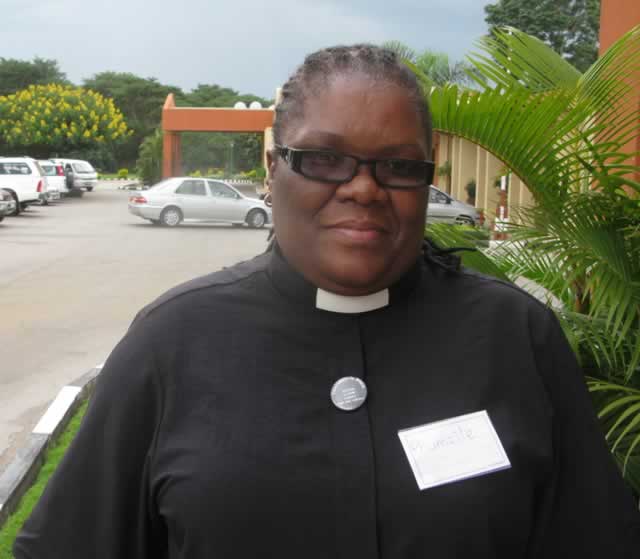What’s faith got to do with it?

Catherine Murombedzi HIV Walk
“ Gone are the days when the church remained silent in the face of Aids-related deaths and was there merely to offer comfort to the bereaved.” These were the words of Reverend Phumzile Mabizela, the Executive Director of the International Network of Religious Leaders — Lay and Ordained Living with or Personally Affected by HIV (Inelera+) at a meeting for the Circle of Concerned African Theologian Women in Kempton Park, South Africa, last month.
“The church has to awaken to the realities of life and address the issue of rebuilding society after the devastation occasioned to it by Aids. Many orphans are now in our midst and we cannot afford to turn a blind eye while purporting to be ascetic Christians who live by the Bible without addressing the root cause of the destruction. We should immediately cease the habit of ‘‘cherry picking’ Bible verses in an attempt to justify the existence of Aids, as God’s punishment for sin. We must do away with the hypocritical and judgmental attitude, Jesus loved unconditionally and did not judge. Who are we, as the church to judge, do we stand righteous above all, entitling us to cast the first stone?” queried Rev Mabizela.
Rev Mabizela is a widow and an ordained priest who through her work in the church identified with Inerela+.
Rev Mabizela said the church must be realistic and acknowledge that the use of condoms is a plausible and realistic measure in the fight against the spread of HIV.
“We cannot blindly prescribe abstinence and faithfulness as the mantra of the unmarried. The reality on the ground reveals that as the church we need to advise on the of use of condoms. We cannot let the youth perish while we remain blinkered by shunning reality on the ground as they continue to get infected and get impregnated and at times die,” she said.
Rev Mabizela, who speaks in a firm voice, said it was up to the church to be a tool in shaping the lives of its congregates.
Rev Mabizela called on faith community leaders to use their positions of trust and influence to effect positive change in the face of the HIV epidemic.
“It is a well known fact that religious leaders hold a unique position in society, serving as the moral campus as it were, thus providing the requisite ethical guidance to their communities,” she said.
“We have to the break the silence, stop stigma and provide prevention, care and treatment services,” said Rev Mabizela.
She challenged the church to be pro-active rather than re-active.
“The church has to help in curbing new HIV infections rather than continue with the approach of taking care for the sick. Do not misquote me, I am not implying that we abandon our care-giving role no, but however, we should extend our efforts in stopping new HIV infections. How? By being realistic, and doing away the ‘‘holier than thou attitude’’, she said.
Rev Mabizela said being open about her status has helped to equip and empower church members who find themselves in the same situation.
“I live positively and openly, I am an agent of hope and change in my church and community,” she added.
Rev Mabizela said the church still has an inclination to say that being HIV+ is punishment, retribution from God, when in actual sense it is not.
She asked how a child who got the virus from the mother can be said to be punished for its sins.
According to the Bible, God is seeking complete transformation of mankind in order that it may be healed. (Romans 12: 2): “Do not conform your selves to the standards of this world, but let God transform you inwardly by a complete change of your mind.”
Inerela+ says that, nobody has power to transform themselves or others; it is God who has and reserves all such powers. Rev Mabizela said the church should be receptive and warm so that they can teach the modern day concept of behavioural change in curbing new HIV infections.
People should be encouraged to abandon risky practices which predispose them to acquiring HIV.
The Bible sounds a strong warning against people’s disobedience in relation to repentance and seeking God’s reprisal on sinful ways. Revelations 2:21 23 notes that “I have given her time to repent of her sins, but she does not want to turn from her immorality. And so I will throw her on to a bed where she and those who committed adultery with her will suffer terribly. — I will do this now unless they repent of the wicked things they did with her”
Following the above excerpts from the Bible, one can easily be convinced that Aids is really a curse/punishment from God for man’s disobedience and wickedness.
On the other hand, the Bible does not provide an explanation about other modes of HIV transmission. Other modes, for instance the mother–to-child transmission, blood transfusion, and sharing sharp objects are potential transmitters of HIV.
Why would God punish such children infected vertically?
It is self-evident from the afore- mentioned discussion that the ecumenical response to HIV and Aids should embrace the concept that no matter how HIV was contracted, our ultimate responsibility as Christians is to emulate Christ by not judging, discriminating against or hating others but by providing love and justice to all.
Rev Mabizela said no one is above life and therefore the church has to create space for positive living.
The patron of Inerela+, Archbishop Emeritus Desmond Tutu in a foreword to a book written by several theologians called “What’s Faith Got to Do With It?” said that faith communities’ silence only serves to increase risk and vulnerability to HIV.
“Our silence serves only to increase risk and vulnerability needlessly.
I hope and believe that we will play a critical role in helping to re-energise, focus and challenge all faith community members to continue to respond to the devastating pandemic of HIV and Aids. Faith communities need to provide leadership to overcome HIV and Aids and recognise people living with HIV as precious members of the community.
It is time for faith-based organisations and communities to lead in promoting life, by providing comprehensive and evidence-based information on preventing transmission of HIV. In addition, women and girls should be guaranteed access to sexual and reproductive health care and be able to exercise their basic human rights,” said Archbishop Tutu.
‘‘What’s Faith Got to Do With It?’’ is one of the many books on HIV written by many theologians, compiled by Carolyne Akinyi Opinde and edited by Prof Ezra Chitando and Peter Nickles.
The story of Inerela+ cannot be complete without mentioning Rev Canon Gideon Byamugisha of Uganda who in 1992 disclosed that he was HIV positive.
Then there was no medication and with him being an ordained Anglican priest heading a parish in Kampala, faith took him through.
Acceptance and disclosure played an important part and today Rev Canon Byamugisha who helped found Inerela+ is today an active committee member.
I end by banswering the question ‘What’s faith got to do with it?” Faith is a cog in the wheel to positive response in turning the HIV epidemic.
Feedback: [email protected] <mailto:[email protected]>







Comments